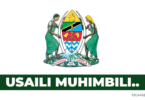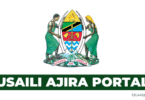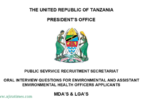Top 20 Frequently Asked Interview Questions at the Bank of Tanzania (BoT) and How to Answer Them
Securing a job at the Bank of Tanzania (BoT) is a prestigious opportunity that requires thorough preparation. Whether you are applying for a role in finance, banking operations, risk management, or customer service, you must demonstrate a deep understanding of banking regulations, monetary policies, and financial management.
In this article, we have compiled 20 frequently asked interview questions at the Bank of Tanzania and provided expert answers to help you excel in your interview.
1. Tell us about yourself.
Answer: “I am a highly motivated finance professional with a background in banking and economics. I hold a degree in [your degree] from [your university] and have experience in [your relevant experience]. I am passionate about financial management, regulatory compliance, and providing excellent customer service.”
2. Why do you want to work for the Bank of Tanzania?
Answer: “The BoT plays a crucial role in economic stability and financial regulation. I am eager to contribute to this mission by leveraging my skills in financial analysis and risk management to support the bank’s strategic goals.”
3. What do you know about the Bank of Tanzania and its functions?
Answer: “The BoT is Tanzania’s central bank responsible for implementing monetary policy, regulating financial institutions, managing foreign reserves, issuing currency, and ensuring financial stability in the economy.”
4. What are the main challenges facing the banking sector in Tanzania?
Answer: “Key challenges include financial inclusion, cybersecurity threats, non-performing loans, inflation control, and adapting to international banking standards.”
5. Explain monetary policy and its impact on the economy.
Answer: “Monetary policy refers to the central bank’s actions to control money supply and interest rates. It influences inflation, employment, and economic growth by adjusting lending rates and open market operations.”
6. How do commercial banks differ from central banks?
Answer: “The central bank, like BoT, regulates monetary policy and oversees financial institutions, while commercial banks provide services like loans, deposits, and money transfers to customers.”
7. How would you handle financial irregularities?
Answer: “I would report the issue to the appropriate authority, ensure confidentiality, and follow the bank’s compliance and ethical procedures.”
8. What experience do you have with financial data analysis?
Answer: “I have experience using financial tools like Excel, SPSS, and financial modeling software to analyze trends, assess risks, and support decision-making.”
9. Describe a time you worked under pressure and how you handled it.
Answer: “In my previous job, I had to prepare a financial report within a tight deadline. I prioritized tasks, worked efficiently, and collaborated with my team to meet the deadline successfully.”
10. What is inflation, and how does it affect the economy?
Answer: “Inflation is the rate at which the general price level of goods and services increases. High inflation reduces purchasing power, while controlled inflation supports economic stability.”
11. How does the Bank of Tanzania control inflation?
Answer: “The BoT controls inflation through monetary policies such as adjusting interest rates, regulating the money supply, and using open market operations.”
12. What do you understand by financial inclusion?
Answer: “Financial inclusion ensures that individuals and businesses have access to affordable financial services, helping to promote economic growth and reduce poverty.”
13. What are some risks faced by banks, and how can they be managed?
Answer: “Banks face risks like credit risk, market risk, operational risk, and liquidity risk. These can be managed through risk assessment, regulatory compliance, and effective internal controls.”
14. What role does the Bank of Tanzania play in exchange rate stability?
Answer: “The BoT monitors foreign exchange markets, manages forex reserves, and intervenes when necessary to maintain currency stability.”
15. What are the key qualities of a good banker?
Answer: “A good banker should have strong analytical skills, attention to detail, integrity, excellent customer service, and deep knowledge of financial regulations.”
16. How do you stay updated with financial and economic trends?
Answer: “I follow reports from financial institutions like BoT, IMF, and World Bank, read financial publications, and attend industry conferences.”
17. What do you understand by AML (Anti-Money Laundering) regulations?
Answer: “AML regulations are laws designed to prevent financial crimes like money laundering and terrorist financing by ensuring financial institutions implement due diligence and reporting measures.”
18. How would you handle a difficult customer?
Answer: “I would stay calm, listen carefully, provide a solution, and escalate the matter if necessary while maintaining professionalism.”
19. Why should we hire you?
Answer: “I have the skills, knowledge, and passion for the banking sector. My background in [mention relevant experience] and my ability to work in a fast-paced environment make me a strong candidate for this role.”
20. Where do you see yourself in five years?
Answer: “I see myself growing professionally within the BoT, contributing to its mission, and taking on leadership roles to make a greater impact on the financial sector.”
Final Thoughts
Preparing for a Bank of Tanzania interview requires a solid understanding of banking regulations, monetary policy, and economic principles. By practicing these frequently asked questions and answers, you can confidently demonstrate your expertise and secure your dream job.
Pro Tip: Research more about BoT’s latest financial reports, policies, and recent updates to make your responses more relevant and insightful.
Good luck with your interview!





